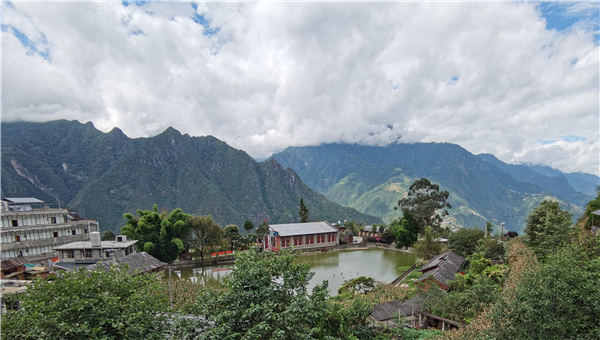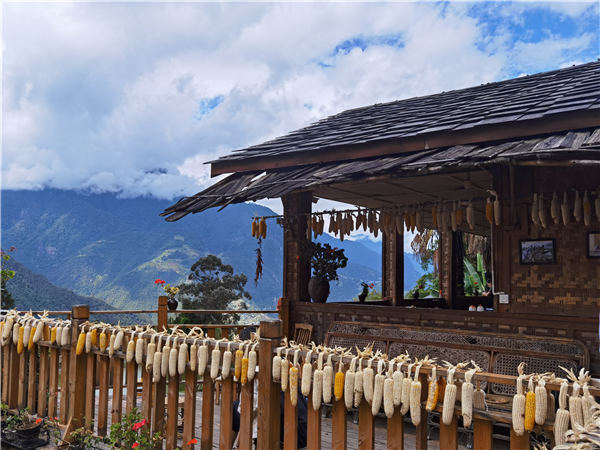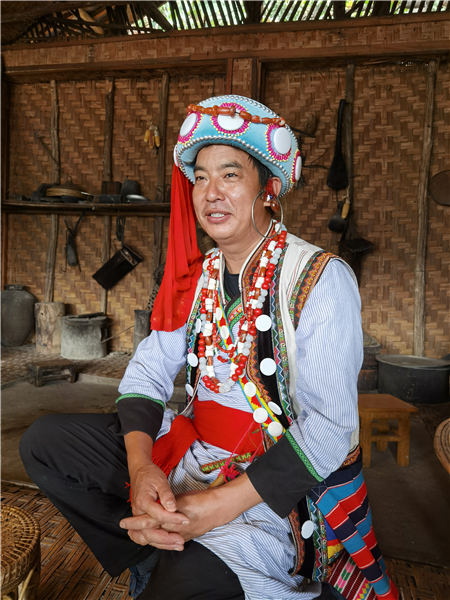Nu way of thinking brings prosperity in NW Yunnan

Up in the mountains of Fugong county, Southwest China's Yunnan province, the village of Laomudeng presents an idyllic countryside scene, with its pleasant natural landscape and well-preserved ethnic culture. [Photo by Cheng Yuezhu/China Daily]
Ethnic hospitality, music and art spark a burgeoning agritourism industry in the mountains of Yunnan, Cheng Yuezhu and Li Yingqing report.
Up in the mountains of Fugong county, Southwest China's Yunnan province, the village of Laomudeng presents an idyllic countryside scene, with its pleasant natural landscape and well-preserved ethnic culture.
The name Laomudeng, transliterated from the local language of the Nu ethnic group, means "where people like to go"-which is the reason that the village has been able to shake off the shackles of poverty through agritourism.
One of the village's leading figures in the development of its tourism offerings is Yu Wulin. His 150 Inn has become a landmark in the village.
The 44-year-old was born and raised in Laomudeng and, because of his skills in ethnic singing and dancing, in 1996 he was selected by a performance troupe and went to work in Shanghai for several years.
After returning to the village, because Yu was among the few residents who could speak mandarin at the time, the villagers often introduced passing backpackers, who came to the area attracted by its natural beauty, to his house.
"In our Nu culture, we have this custom that the more guests, the more fortunate the household. So we frequently accommodated tourists with a makeshift bed in our living room," Yu recalls.
"Many insisted on leaving us some money. And some guests suggested to me that I should open up an inn to increase our income," Yu says.
Therefore, in 2001, he built a crude single-story house with eight bunks to accommodate tourists.
Without any experience or knowledge of the tourism industry, the construction of his inn was mostly based on the requests of his guests.

Up in the mountains of Fugong county, Southwest China's Yunnan province, the village of Laomudeng presents an idyllic countryside scene, with its pleasant natural landscape and well-preserved ethnic culture. [Photo by Cheng Yuezhu/China Daily]
As time went on, more visitors started asking if the inn offered rooms with en-suite facilities, so the hostelry was refurbished and has gradually evolved into a three-story building with en-suite rooms and a courtyard. Yu has also built a second inn in the village.
His annual earnings from the original has increased from just several hundred yuan in the beginning to over 200,000 yuan ($29,500) last year.
Apart from being an innkeeper, Yu is now also a provincial-level inheritor of intangible cultural heritage with his mastery in odede (exclamation in Nu language), a Nu ethnic song style that incorporates the music of the dabiya, a plucked, stringed instrument, with dancing.
The inn has now become a base for local artists and music lovers. Many guests will invite local artists to perform at the inn, and Yu will often join in. During school holidays, children living nearby often come to the inn to learn how to play ethnic instruments, and performance skills, such as singing and dancing, from the artists.[page]

Yu Wulin, inn keeper and inheritor of intangible cultural heritage. [Photo by Cheng Yuezhu/China Daily]
The regular performers include 67-year-old Bo Jinshan, a provincial-level inheritor in dabiya. He explains that odede is often used among the Nu ethnic group to express love, and he voluntarily comes to the inn and visits the local kindergarten to teach children.
"As long as they want to learn, we will never turn them away. Any children interested in learning the traditional arts can come here, and we will offer them free board and lodging," Yu says.
"The learning is very flexible. We simply want the youngsters to learn about the existence of these ethnic cultural elements as early as possible. If they are still interested when they grow up, they might carry on learning."
The 150 Inn set an example for the locals, and after 2004, other homestays were established, and the village now has over 20 inns.
These, in turn, drove the development of the village's agricultural industry, as the hotels depend on the local farmers for food supplies and the tourists purchase their products as local specialities, including matsutake mushrooms and honey.
One such product that is particularly popular among tourists is tea. In 2010, a farmers' cooperative was established in the village, purchasing and growing over two million tea seedlings.

Up in the mountains of Fugong county, Southwest China's Yunnan province, the village of Laomudeng presents an idyllic countryside scene, with its pleasant natural landscape and well-preserved ethnic culture. [Photo by Cheng Yuezhu/China Daily]
According to local government statistics, by the end of 2019, the cooperative's tea growing area has exceeded 132 hectares and its members have increased to 125 households.
The cooperative has also been working with external companies in developing their own tea brand, the Laomudeng mountain tea, which produced revenues of four million yuan last year.
Facing a growing market demand, the cooperative is now planning to expand its factory and upgrade its production line in order to produce tea more efficiently.